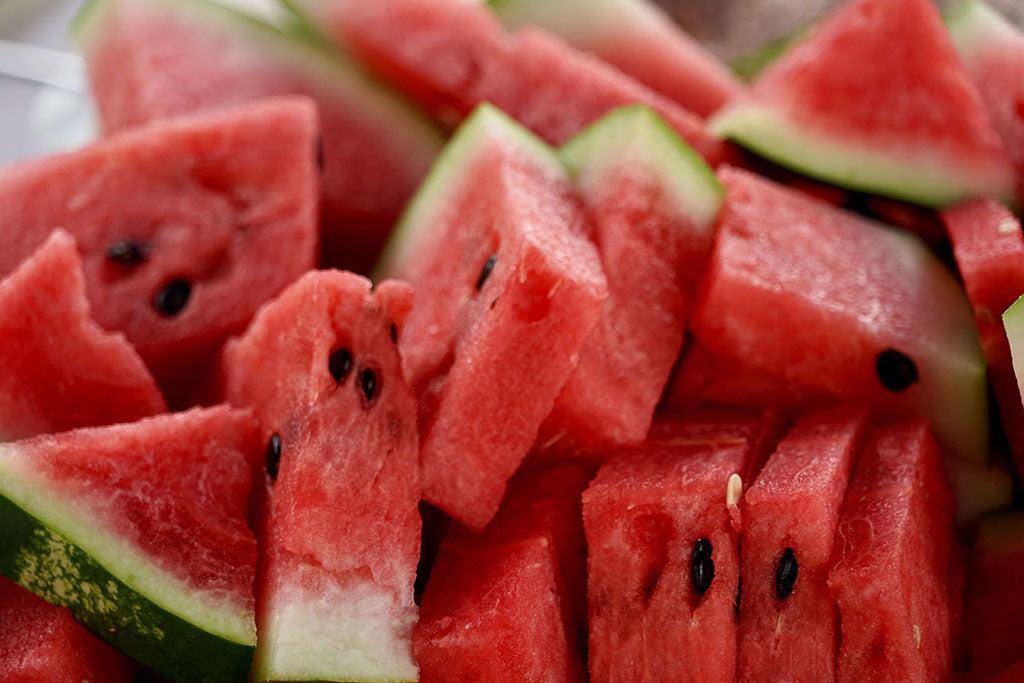Summary: Can dogs eat watermelon? What about watermelon rind and seeds? In this blog, learn whether dogs can have watermelon and if it’s good for them… Watermelon is an incredibly popular, refreshing fruit and drink garnish, particularly in the warmer months. But can our canines enjoy a slice or two too…? Can Dogs Have […]
Can Dogs Have Watermelon?

Summary: Can dogs eat watermelon? What about watermelon rind and seeds? In this blog, learn whether dogs can have watermelon and if it’s good for them…
Watermelon is an incredibly popular, refreshing fruit and drink garnish, particularly in the warmer months. But can our canines enjoy a slice or two too…?
Can Dogs Have Watermelon?
Yes, but only in seedless, rindless, small, chopped-up chunks. Diabetic dogs should not be offered watermelon or other fruits though, due to the high levels of natural sugar that occur in them.
Is Watermelon Good For Dogs?
Watermelon is rich in fiber, antioxidants, potassium, and vitamins B6, A, and C. It’s also hydrating at 92% water and relatively low in calories so it can certainly be considered a healthy treat to offer your dog.
Can Dogs Eat Watermelon Rind?
No. A dog’s digestive system can’t break the rind down properly and can cause intestinal blockages. Always remove the rind and chop the watermelon flesh into small pieces before serving to your dog – this will also minimize the risk of choking.
PetLab Co. Pro Tip: After you’ve removed the seeds and the rind from the watermelon and chopped it into bitesize chunks, consider freezing the pieces and offering them to your dog once they’re frozen. This can help cool them off and keep them hydrated on a hot day!

Can Dogs Eat Watermelon Seeds?
No. One or two mature seeds guzzled down by accident shouldn’t cause a problem but if too many are ingested, they may not pass properly through your dog’s digestive system. This can cause an intestinal blockage – particularly in smaller dog breeds. Seedless watermelon is always the best option for a dog.
It’s always worth remembering that any human food should only be given to a dog as an occasional treat and should only make up a maximum of 10% of your dog’s daily diet. This helps them avoid putting on too much weight or causing diabetes.
Too much watermelon can cause an upset stomach in doggos and induce looser stools. As with humans, all dogs will react differently to different foods so always be mindful of this when trying them on new foods, snacks, and treats regardless of whether they’re deemed safe.
There are some foods you should absolutely avoid feeding your dog. Find an extensive list below of food known to be toxic to dogs that you should make sure your dog never consumes:

Sources
Author Bovsun, Mara “Can Dogs Eat Watermelon?” American Kennel Club, May 22. 2021 https://www.akc.org/expert-advice/nutrition/can-dogs-eat-watermelon/
Author Guthrie, Lynn “Can Dogs Eat Watermelon? Yes, But Lose The Seeds!” Prrs & Wags by Pumpkin, Feb 28. 2022 https://www.pumpkin.care/blog/can-dogs-eat-watermelon/
 S
S



